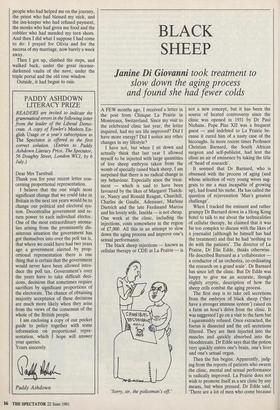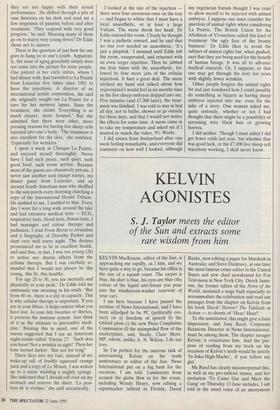BLACK SHEEP
Janine Di Giovanni took treatment to
slow down the aging process and found she had fewer colds
A FEW months ago, I received a letter in the post from Clinique La Prairie in Montreaux, Switzerland. Since my visit to the celebrated clinic last year, the letter inquired, had my sex life improved? Did I have more energy? Did I notice any other changes in my lifestyle?
I have not, but when I sit down and actually think that last year I allowed myself to be injected with large quantities of live sheep embryos taken from the womb of specially raised black sheep, I am surprised that there is no radical change in my behaviour. Especially since the treat- ment — which is said to have been favoured by the likes of Margaret Thatch- er, Nancy and Ronald Reagan, Churchill, Charles de Gaulle, Adenauer, Marlene Dietrich and the late Ferdinand Marcos and his lovely wife, Imelda — is not cheap. One week at the clinic, including the injections, costs somewhere in the region of £7,000. All this in an attempt to slow down the aging process and improve one's sexual performance.
The black sheep injections — known as cellular therapy or CDE at La Prairie — is `Sorry, sir, the policeman's off.' not a new concept, but it has been the source of heated controversy since the clinic was opened in 1931 by pr Paul Niehans. Pope Pius XII was a frequent guest — and indebted to La Prairie be- cause it cured him of a nasty case of the hiccoughs. In more recent times Professor Christian Barnard, the South African surgeon and self-publicist, had lent the clinic an air of eminence by taking the title of 'head of research'.
It seemed that Dr Barnard, who is obsessed with the process of aging (and whose selection of very young wives sug- gests to me a man incapable of growing up), had found his niche. He has called the question of rejuvenation `Man's greatest challenge'.
When I tracked the eminent and rather grumpy Dr Barnard down in a Hong Kong hotel to talk to me about the technicalities of cellular therapy, he claimed that it was far too complex to discuss with the likes of a journalist (although he himself has had the treatment) and that he had 'nothing to do with the patients'. The director of La Prairie, Dr Elie Edde, thinks otherwise. He described Barnard as a 'collaborator a conductor of an orchestra, co-ordinating the research on a grand scale'. Dr Barnard has since left the clinic. But Dr Edde was happy to give me an accurate, though slightly cryptic, description of how the sheep cells combat the aging process.
The first step is to take cell secretions from the embryos of black sheep (`they have a stronger immune system') raised on a farm an hour's drive from the clinic. It was suggested I go on a visit to the farm but I squeamishly refused. Once extracted, the foetus is dissected and the cell secretions filtered. They are then injected into the muscles and quickly absorbed into the bloodstream. Dr Edde says that the potion very quickly enters one's brain, one's liver and one's sexual organ.
Then the fun begins. Apparently, judg- ing from the reports of patients who swarm The clinic, mental and sexual performance is radically improved. La Prairie does not wish to promote itself as a sex clinic by any means, but when pressed, Dr Edde said, `There are a lot of men who come because they are not happy with their sexual performance.' He shifted through a pile of case histories on his desk and read me a few responses of patients before and after treatment. 'They respond with very good progress,' he said. Meaning many of them go on to marry very young wives? Dr Edde chose not to answer.
There is the question of just how far one goes to hang on to one's youth. Apparent- ly, the issue of aging gracefully simply does not come into the picture for some people. One patient in her early sixties, whom I had dinner with, had travelled to La Prairie from Leicester five times since 1982 to have the injections. A director of an international textile corporation, she said she originally sought out La Prairie for a cure for her memory lapses. Since the treatment, she claims 'Everything is so much clearer, more focused.' But she admitted that there were other, more pressing reasons for having live sheep cells injected into one's body: 'The treatment is also excellent for the skin,' she confided. `Especially for wrinkles.'
I spent a week at Clinique La Prairie, and enjoyed myself thoroughly. Never have I had such peace, such quiet, such good food, such room service. Because most of the guests are obsessively private, I never saw another soul except nurses, my dinner guest from Leicester, and an ancient South American man who shuffled to the sun-porch every morning clutching a copy of the International Herald Tribune. He nodded to me, I nodded to him. Every day I went for a long walk around the lake and had extensive medical tests — ECG, respiratory tests, blood tests, fitness tests. I had massages and colour therapy and pedicures. I read From Beirut to Jerusalem and a biography of Dorothy Parker and slept very well every night. The doctors pronounced me to be in excellent health, and said that, in fact, I was too young (28) to notice any drastic effects from the cellular therapy. But I was carefully re- minded that I would not always be this young, this fit, this healthy.
'For age 20 to 30, you are mentally and physically at your peak,' Dr Edde told me ominously one morning in his study. 'But from 40 on, there is a slip in capacity. This is why cellular therapy is important. If you are in your fifties, it helps restore what you have lost. In your late twenties or thirties, it protects the immune system. Just think of it as the ultimate in preventive medi- cine.' Bearing this in mind, one of the nurses suggested that I use an American night-cream called 'Eterna 27'. 'Such skin you have! Not a wrinkle in sight!' Then her tone turned darker. 'But not for long!'
Three days into my visit, instead of my wake-up call of freshly squeezed orange juice and a copy of Le Monde, I was woken up to a nurse wielding a mighty syringe. She indicated that I should roll over on my stomach and remove the sheet. `La posi- tion de la victime,' she said sarcastically.
I looked at the size of the injection there were four enormous ones on the tray — and began to whine that I must have a local anaesthetic, or at least a large Valium. The nurse shook her head. Dr Edde entered the room. Clearly he thought I was a pathetic coward, and he said that no one ever needed an anaesthetic. 'It's just a pinprick.' I moaned until Edde left the room, exasperated, and returned with an even larger injection. Then he jabbed me four times with the anaesthetic, fol- lowed by four more jabs of the cellular injections. It hurt a great deal. The nurse stroked my hand and talked about how rejuvenated I would feel in six months time as the live sheep embryos dripped into me. Five minutes (and £7,000 later), the treat- ment was finished. I was told to stay in bed all day, not to bathe, shower or go outside for three days, and that I would not notice the effects for some time. A nurse came in to take my temperature and asked me if I wanted to watch the video, 91/2 Weeks.
I did return from Switzerland after one week feeling remarkable, and everyone did comment on how well I looked, although my vegetarian friends thought I was cruel to allow myself to be injected with animal embryos. I suppose one must consider the question of animal rights when considering La Prairie. The British Union for the Abolition of Vivisection called this kind of treatment 'the ugly face of the beauty business'. Dr Edde likes to avoid the subject of animal rights but, when pushed, says that they are being used for the benefit of human beings. It was all to advance medical research. Or, I suppose, so that one may get through the next ten years with slightly fewer wrinkles.
Other people forgave the animal rights bit and just wondered how I could possibly do something as bizarre as having sheep embryos injected into me, even for the sake of a story. One woman asked me, quite seriously, whether or not I had thought that there might be a possibility of sprouting wiry black hair or growing hooves.
I did neither. Though I must admit I did get fewer colds last year, but whether that was good luck, or the £7,000 live sheep cell injections working, I shall never know.



























































 Previous page
Previous page